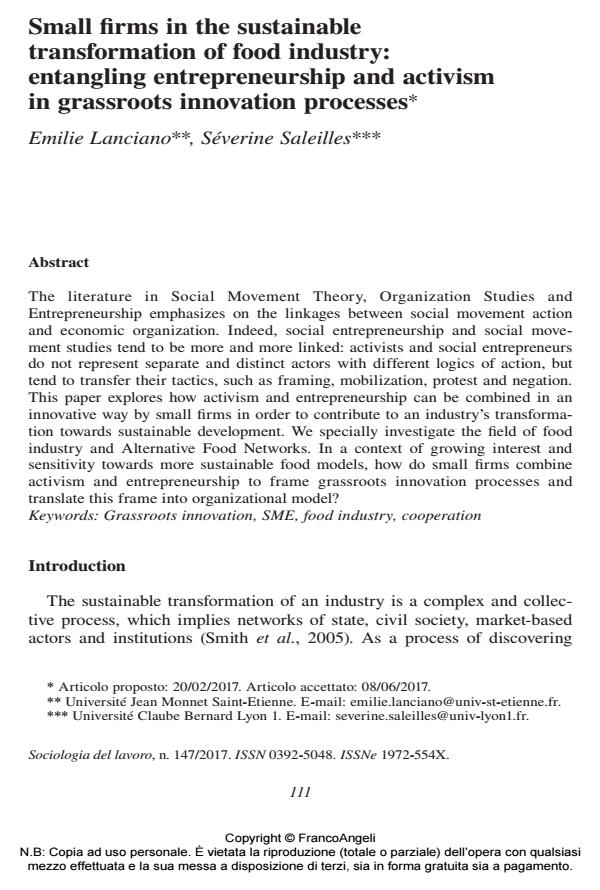Small firms in the sustainable transformation of food industry: entangling entrepreneurship and activism in grassroots innovation processes
Titolo Rivista SOCIOLOGIA DEL LAVORO
Autori/Curatori Emilie Lanciano, Séverine Saleilles
Anno di pubblicazione 2017 Fascicolo 2017/147
Lingua Inglese Numero pagine 17 P. 111-127 Dimensione file 120 KB
DOI 10.3280/SL2017-147006
Il DOI è il codice a barre della proprietà intellettuale: per saperne di più
clicca qui
Qui sotto puoi vedere in anteprima la prima pagina di questo articolo.
Se questo articolo ti interessa, lo puoi acquistare (e scaricare in formato pdf) seguendo le facili indicazioni per acquistare il download credit. Acquista Download Credits per scaricare questo Articolo in formato PDF

FrancoAngeli è membro della Publishers International Linking Association, Inc (PILA), associazione indipendente e non profit per facilitare (attraverso i servizi tecnologici implementati da CrossRef.org) l’accesso degli studiosi ai contenuti digitali nelle pubblicazioni professionali e scientifiche.
The literature in Social Movement Theory, Organization Studies and Entrepreneurship emphasizes on the linkages between social movement action and economic organization. Indeed, social entrepreneurship and social movement studies tend to be more and more linked: activists and social entrepreneurs do not represent separate and distinct actors with different logics of action, but tend to transfer their tactics, such as framing, mobilization, protest and negation. This paper explores how activism and entrepreneurship can be combined in an innovative way by small firms in order to contribute to an industry’s transformation towards sustainable development. We specially investigate the field of food industry and Alternative Food Networks. In a context of growing interest and sensitivity towards more sustainable food models, how do small firms combine activism and entrepreneurship to frame grassroots innovation processes and translate this frame into organizational model?
La letteratura accademica dello studio dei movimenti sociali e delle piccole e medie imprese, pone l’accento sulla relazione che può intercorrere tra l’azione di alcuni movimenti sociali e l’azione imprenditoriale ed economica: attivisti ed imprenditori sociali non sono attori distinti con logiche separate ma usano tattiche e piani d’azione simili. Questo articolo si interessa alla combinazione dell’attivismo civico e politico e l’imprenditorialità e vuole dimostrare come tali interazioni pos-sano esistere e funzionare in modo innovativo in piccole imprese al fine di contribuire alla trasformazione di un settore nell’ottica di uno sviluppo sostenibile. Viene studiato in particolar modo il settore dell’industria alimentare e dei cosiddetti sistemi alimentari alternativi, interrogandosi su come, in un contesto di crescente interesse e sensibilità verso modelli alimentari più sostenibili, le piccole imprese riescano a combinare l’attivismo e l’imprenditorialità per inquadrare i processi di grassroots innovazione e tradurre questo quadro in modello organizzativo.
Parole chiave:Piccole e medie imprese; grassroots innovazione; attivismo; industria alimentare
- Industrial Processes Management for a Sustainable Society: Global Research Analysis Emilio Abad-Segura, Manuel E. Morales, Francisco Joaquín Cortés-García, Luis Jesús Belmonte-Ureña, in Processes /2020 pp.631
DOI: 10.3390/pr8050631
Emilie Lanciano, Séverine Saleilles, Small firms in the sustainable transformation of food industry: entangling entrepreneurship and activism in grassroots innovation processes in "SOCIOLOGIA DEL LAVORO " 147/2017, pp 111-127, DOI: 10.3280/SL2017-147006